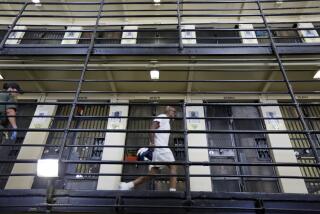Judges Hear Keating Case Arguments
- Share via
Arguing that jurors who convicted Charles H. Keating Jr. received proper instructions, prosecutors on Tuesday urged a panel of appellate judges to reinstate Keating’s state court conviction for swindling Lincoln Savings & Loan investors.
Keating, the most notorious figure of the 1980s savings and loan scandals, sat impassively in a Pasadena courtroom as three judges from the U.S. 9th Circuit Court of Appeals heard the arguments that could send him back to state prison.
The panel is not expected to rule for months. But the judges’ intense questioning of Keating’s lawyer was “heartening,” said William Hodgman, the Los Angeles County prosecutor who won the conviction of Keating that was overturned last year.
“Charlie’s not completely free yet,” Hodgman said. “He’s got a sword of Damocles hanging over his head. And it’s hanging a little lower today.”
In a case before Los Angeles County Superior Court Judge Lance A. Ito, jurors convicted Keating in 1991 on 17 counts of defrauding investors who cashed in federally insured certificates of deposit to buy junk bonds issued by his American Continental Corp. The investors said the risks of the bonds weren’t fully disclosed to them.
American Continental, based in Phoenix, was the parent of Irvine-based Lincoln. When Lincoln was seized in 1989, the bonds were rendered worthless. Regulators later estimated that Lincoln’s bailout cost taxpayers $3.4 billion.
Keating’s lawyer, Stephen C. Neal, last year persuaded U.S. District Judge John G. Davies to throw out Keating’s state conviction.
Davies ruled that Ito, best known for presiding over O.J. Simpson’s murder trial, had unconstitutionally expanded state law by allowing Keating to be convicted of aiding and abetting fraud even though the actual bond sellers had no intent to defraud investors.
Ito also instructed the jurors on the meaning of “direct perpetrator,” even though there was no evidence Keating was one, because he never personally sold a bond.
Neal said Tuesday that jurors were “never told that you have to have face-to-face conduct” in order to cause fraud.
But California Deputy Atty. Gen. Sanjay T. Kumar argued that Ito had properly told the jury that Keating could be convicted for aiding and abetting deceptions by the bond sellers.
Regardless of which side prevails in the latest battle, additional appeals are expected.
Keating was sentenced to 10 years in prison on the state securities fraud charges and to 12 years and seven months on a separate federal conviction for looting Lincoln and defrauding investors.
The federal conviction has also been overturned on grounds the federal jurors improperly learned of and discussed the earlier conviction in Ito’s court.
Keating served four years and nine months behind bars before being released in December.
Times wire services contributed to this report.
More to Read
Sign up for Essential California
The most important California stories and recommendations in your inbox every morning.
You may occasionally receive promotional content from the Los Angeles Times.














